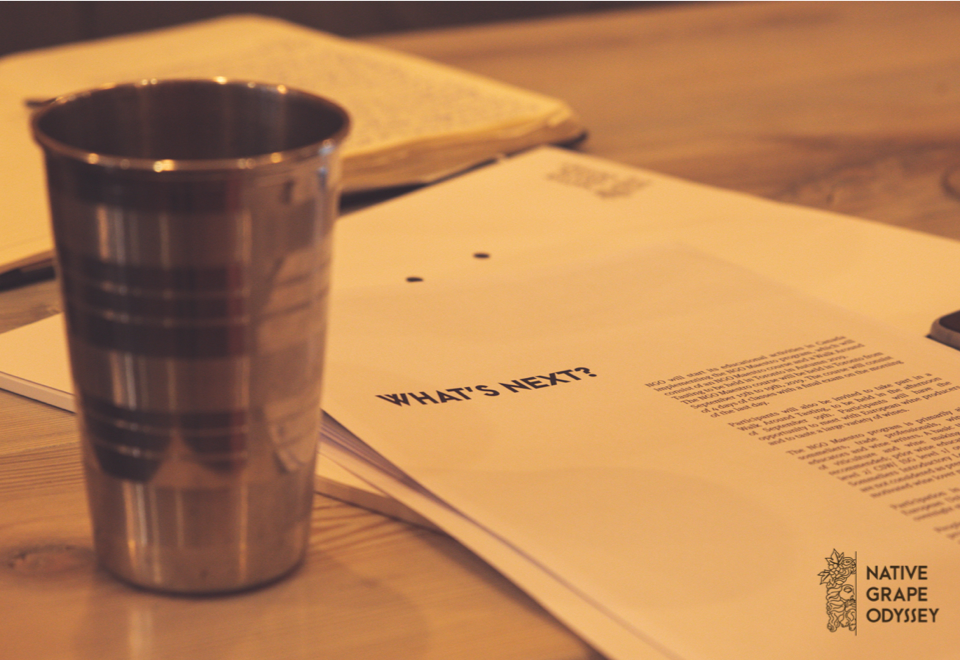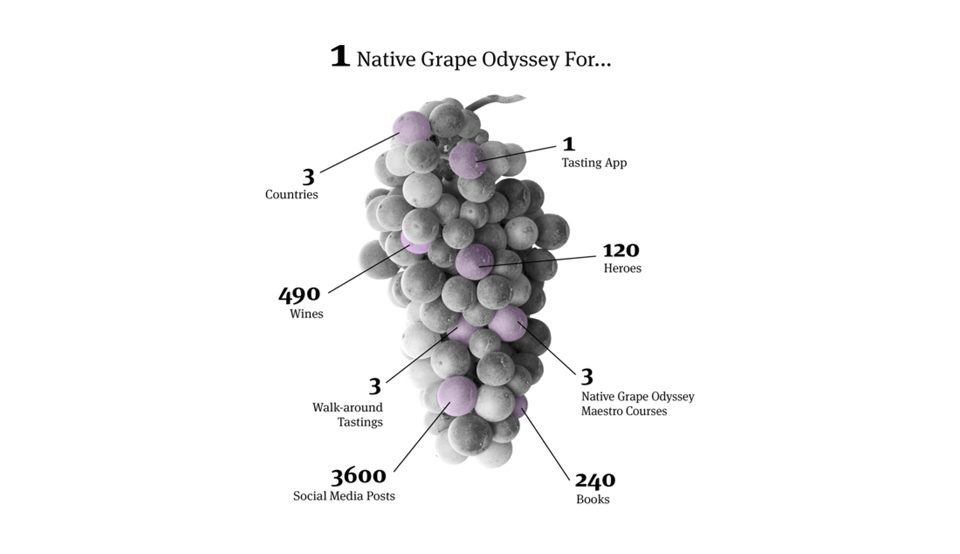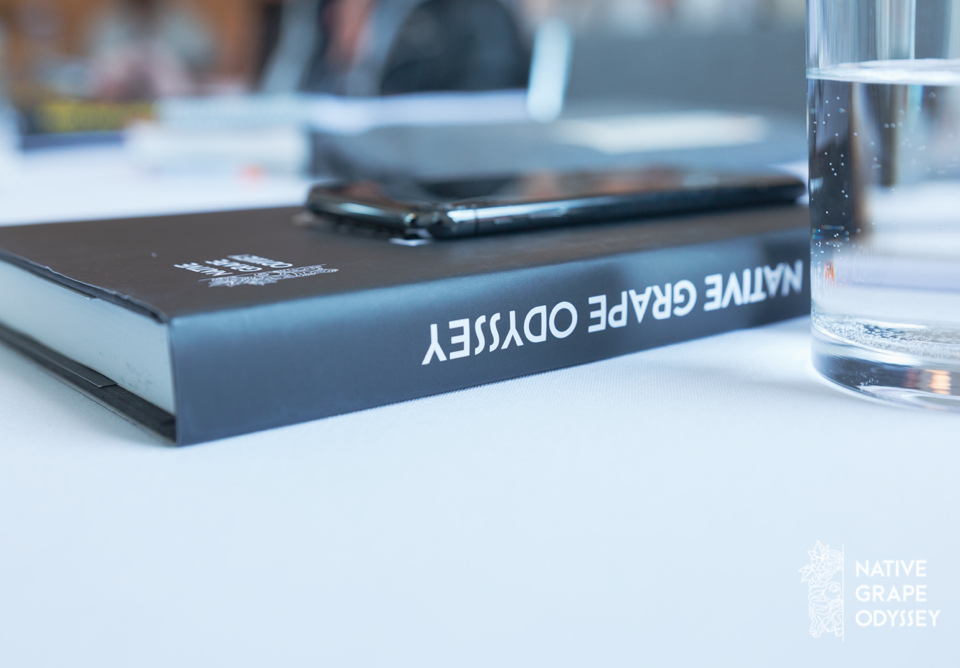
How to describe the indescribable: the first NGO course in Canada harmonized poetry and technique
September 23, 2019
Storytelling with precision: The educational approach of the first Native Grape Odyssey course in Canada
October 12, 2019In Toronto, The Native Grape Odyssey unveils three strategies to educate Canadians about European wine

Daniele Cernilli, instructor of the NGO Maestro Canada course and Stevie Kim, General Coordinator of the NGO Project, give Jessica Weatherbee a certificate of completion for the NGO Maestro course.
The Native Grape Odyssey (NGO) Maestro course, held in Toronto, Canada from September 15th to 19th, highlighted this project’s effective educational formula which propelled the promotion of European wine abroad forward. As the students themselves stated, there are three main aspects that made the difference, making this course a valuable educational experience.
It is not enough for an educational program to be well structured and thorough in order to be effective: the way in which it is communicated is also important. This is also true in the world of wine, and it is precisely for this reason that the Native Grape Odyssey (NGO) project, an initiative that has been co-financed by the European Union, has decided to organize its course on European wine in Canada (15-19 September 2019), and it has formulated an educational plan developed specifically for the needs of the professionals it addresses. In concrete terms, the techniques used can be summarized in three points.
The first question that the organizers of the NGO course asked themselves is: “Which aspects within this field do we take for granted that might not be so intuitive to the group of people sitting in front of us?” In response to this question, Daniele Cernilli, the instructor of the NGO Maestro Canada course was of the opinion that:
The Anglo-Saxon attitude is that of always favoring the individual vine over its origin, because they have international vine varieties as a fundamental focus; this is what they are able to understand with some ease. The challenge is to try to bring them to the understanding that many areas, such as those in the Mediterranean in particular, are based more on origin than on individual vines and that some wines are the result of blends. The vine that corresponds to the wine is something immediate, quite simple, but their origin, a history of hundreds of years for certain wines and the use of certain varieties, this is the interesting thing and less obvious.
The choice of telling the story of a wine from its origin allows the participants to delve into the historical, cultural and geographical aspects of a territory, which are of predominant influence in the case of European wines. This point is particularly true for Italy, where each region, or rather each territory, represents a reality in its own right, as can be seen from the large number of designations of origin [more than 500].
There are many facets that one might assume make a European wine complex to a foreign audience, but for this reason -and this is the second NGO strategy employed- it is necessary to keep communication as simple as possible. Cernilli the teacher, was able to engage his listeners thanks to his use of immediate language, using personal experiences, historical anecdotes and metaphors, without forgoing a pinch of irony. For example, when answering a student’s question about oak use in wine he replied “the problem is not the pot, it is the chef!”, giving those involved a new way to think about winemaking and the challenges it faces.
Even those who work behind the scenes have an important role to play, and this brings us to our third point. During the five days of the course, the NGO team provided 24-hour assistance, working to file details, tending to matters that had been overlooked or just providing one-on-one help with the attendees. The team’s involvement helped the smooth running of the entire course which left participants feeling highly appreciative. An instance in which the team were able to add value to the course and the overall experience was by reiterating the in-class names and spellings of the various vines and regions within an online group chat session. The NGO team is international and composed of people with different skill-sets, making them particularly suited to provide solutions to the sensibilities and problems that might crop-up in a culturally diverse environment.

Daniele Cernilli, instructor of the NGO Maestro Canada course and Stevie Kim, General Coordinator of the NGO Project, give Jessica Weatherbee a certificate of completion for the NGO Maestro course.
particularly suited to provide solutions to the sensibilities and problems that might crop-up in a culturally diverse environment.
After the course in Canada, the NGO team returned to its home-base in Verona, Italy, but the events coming up in Russia and Japan are imminent. Those interested in attending the NGO course in one of these countries can get more information at the following link: canada.nativegrapeodyssey.com/sign-up-form/
About: Native Grape Odyssey is a project financed by the European Union and managed by Unione Italiana Vini and Interprofesional del Vino de España (OIVE) for the promotion of PDO and PGI European wines abroad, in particular in three countries: Japan, Canada and Russia. In order to achieve this, the Native Grape Odyssey educational program will organize wine seminars, workshops and b2b meetings both in these countries and in Verona, Italy, inviting wine experts and influencers from these countries. These events, realized in the span of three years (2019-21) aim at creating awareness about European native wines abroad, in particular Italian and Spanish wines, which share a long tradition and a high standard of quality.


